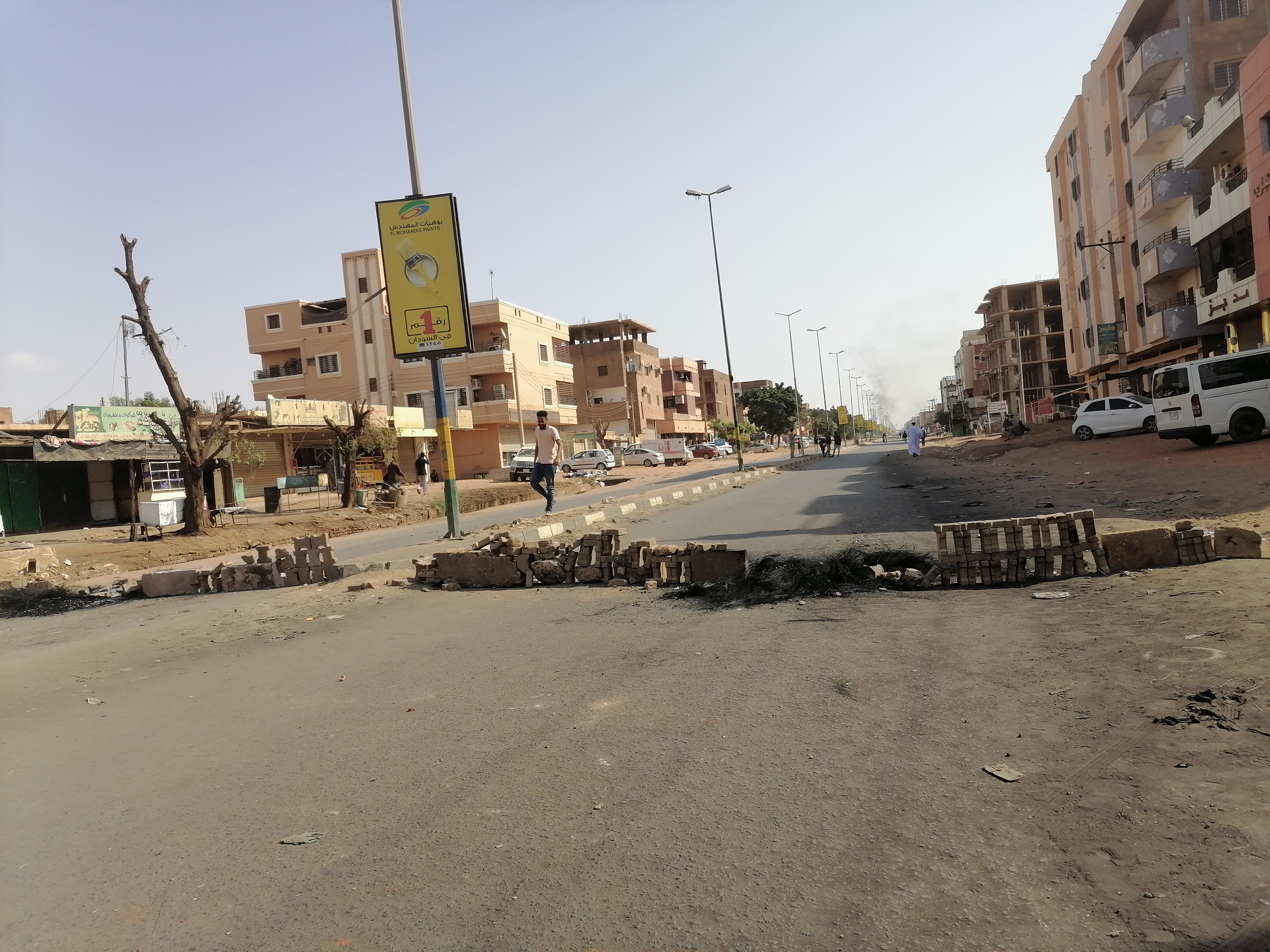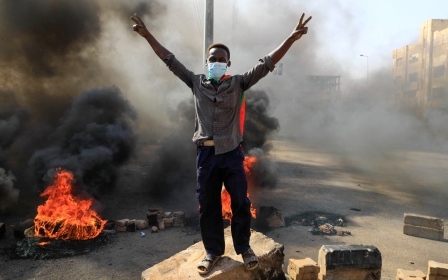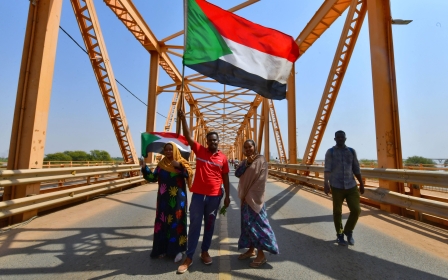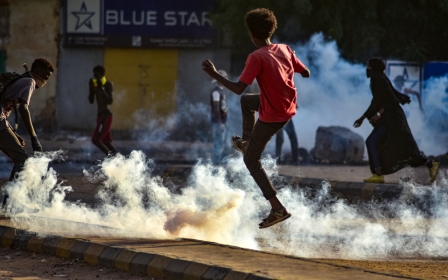Sudan coup: Protesters draw on generations of experience to resist military takeover
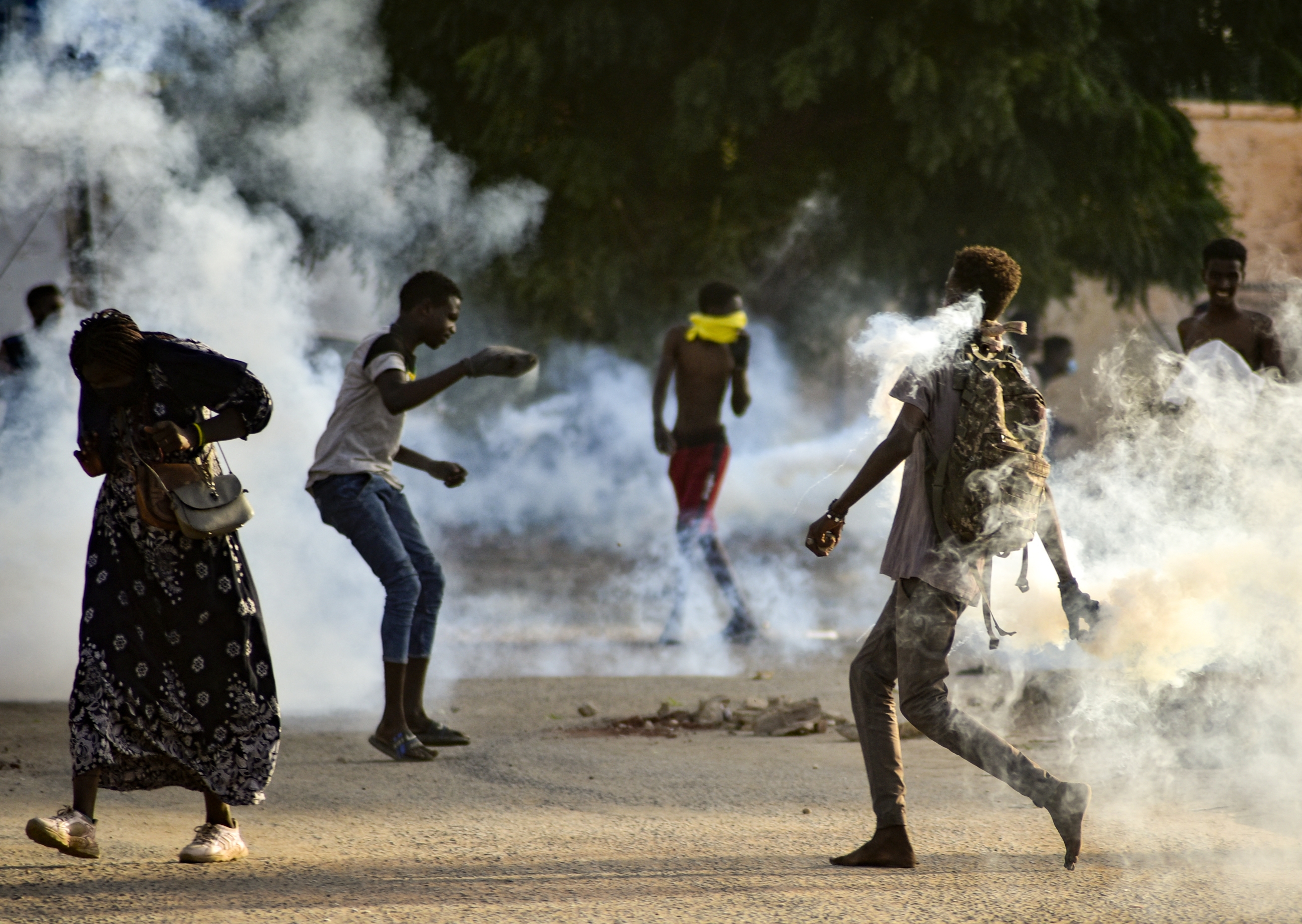
In October 1964, when a popular uprising overthrew the military dictatorship that then ruled Sudan, 72-year-old Youssef Sir al-Khatim was in secondary school, but he still remembers how civil disobedience helped put an end to the autocratic rule of President Ibrahim Abboud.
“I can remember well the attempts of the dictator to use violence against the protesters, killing many university students and trying to disconnect the protesters from each other in order to weaken the movement of the demonstrations," he told Middle East Eye.
Other uprisings in Sudan have repeated the same tactics, combined with strikes and demonstrations, to bring down government after government - the latest target being General Abdel Fattah al-Burhan, who ousted the civilian government and its prime minister, Abdalla Hamdok, on Monday.
So far at least eight protesters are thought to have been killed according to health ministry officials, as the military once again attempts to break demonstrations against its rule.
However, Sir al-Khatim pointed out that each generation learns from the previous one and said that in 2021, with activists once again rallying to the slogan of "freedom, justice and peace" against military rulers, the accumulation of decades of experience has reached its peak.
New MEE newsletter: Jerusalem Dispatch
Sign up to get the latest insights and analysis on Israel-Palestine, alongside Turkey Unpacked and other MEE newsletters
Crackdown
Since the military takeover on Monday, Burhan has moved to crack down on his opponents
The military and the paramilitary Rapid Support Forces (RSF) have begun a widespread detention campaign against activists, journalists, and officials and supporters of the overthrown civilian government.
'Sudanese trade unions and the fronts or unity of the trade unions...can always bring down the dictatorships'
- Sudanese Professional Association source
Multiple sources said that some former officials - including Faiz al-Salik, the former media advisor of the prime minister - had been arrested, while the Sudanese Journalists Network (SJN) said around five journalists had been arrested and others had been summoned for investigation by the security organs. The military also dissolved the administration of the state radio and TV, appointing a new manager.
An SJN source told MEE that the state radio has been occupied by military and RSF officers, in a move that threatens the lives of the journalists working there.
Khalid Hussein, a 52-year old worker in the Sudanese railways, took part in the April 1985 uprising against then-ruler Jaafar Nimeiry and sees parallels with the current situation.
Hussein said the protesters in that upheaval used old means of communication like telegraphs, the postal authority and the trains to send messages from city to city in order to connect the trade unions, political parties and activists.
He said subsequent uprisings had used the same core tactics, while adding modern technologies like social media and mobile phones.
Trade unions
The trade unions in Sudan have always played crucial roles in affecting political change and the current uprising is no different.
A leading member of the Sudanese Professional Association (SPA) union told MEE that organised labour was the main means of articulating the demands of the people during the uprisings of 1964, 1985 and 2019.
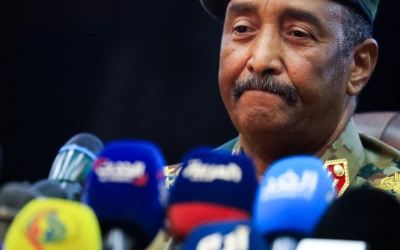
“Sudanese trade unions and the fronts or unity of the trade unions...can always bring down the dictatorships," he said, speaking anonymously out of safety concerns.
"This happened under the name of the Syndicates Front in 1964, under the name of the Trade Unions Alliance in 1985 and the SPA in December 2018, so now this is the time for the trade unions to prove once again that they can bear the political change in the country and defeat this coup."
The SPA has called on the Sudanese people to stage nationwide public disobedience to defeat the current military coup.
Following the coup, Burhan issued an order dissolving the country's trade unions, but new labour leaders have already emerged, organising shutdowns across Sudan.
University teachers, doctors, engineers and the majority employees of the different public sector institutions have already gone on strike amid wide paralysis of the public sector and closure of markets and public transportation.
Unification against the coup
Another SPA leading member, Mohammed Naji al-Assam, said that throughout their history, the Sudanese have accumulated a strong set of tools to defeat dictatorships.
He called on protesters not to respond to provocations by the military and the security organs aimed at dragging the revolutionaries into violence.
“Our unification as pro-democracy protesters, peaceful protesting, civil disobedience and the political strike are all our decisive tools to defeat any coup attempt,” Assam said, addressing a gathering of protesters on the airport street on Wednesday.
Protesters have put up barricades across different cities, blocking neighbourhoods and even main streets amid widespread cat and mouse clashes between the protesters and the military.
The Central Committee of Sudanese Doctors, which is one of the active groups in leading the protests and the strike, has urged doctors to stop working in hospitals, apart from the emergency units, and to fully withdraw from military hospitals.
It has also called for doctors to form field operation rooms to treat casualties among the protesters.
The SPA, political parties, civil society organisations and resistance committees have called for a million-man march on 30 October to bring down Burhan.
Mohamed Badawi, a senior analyst in the African Center for Justice and Peace Studies (ACJPS), told MEE that the protesters have to use the tools of civil disobedience wisely.
“We've seen these battles since 1964 until now and I believe that, despite all the aggressive tactics used by the militaries, the protesters are getting more ground every time due to the accumulation of the experience of the pro-democracy protesters,” he said.
“We have to deal wisely with the tool of civil disobedience, especially with the deteriorating economic situation."
This article is available in French on Middle East Eye French edition.
Middle East Eye delivers independent and unrivalled coverage and analysis of the Middle East, North Africa and beyond. To learn more about republishing this content and the associated fees, please fill out this form. More about MEE can be found here.


